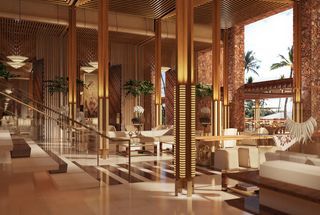The Imperative for Exceptional Hotel Interior Design

It's so often said that we are what we eat, but additionally, we are where we live. Homes, offices and all matter of public spaces influence our moods and the conversations we have as well as motivate us to think differently about the world.
As community leaders, not only should hoteliers strive to serve their surrounding neighborhoods by delivering on all guest service promises, providing jobs and acting as either casual or corporate meeting places, but we should also start to think about how we are inspiring those around us through the physical presentation of our products.
Hotels can be so much more than mere heads-in-beds structures. Every corridor, guestroom, carport, lobby bar or alcove is an opportunity to enhance a person's internal drive or creative spirit by paying attention to the space's design. Moreover, and hitting closer to home, hotel interior design can lead to better customer satisfaction scores, higher occupancy, commanding a greater ADR and more support from locals.
As this is an all-too-critical aspect of any property – in addition to one that's often overlooked or in need of a refresh – I've reached out to the enigmatic Todd-Avery Lenahan – international luxury hotel, resort, estate designer and CEO/Founder of award-winning TAL Studio
What makes a great hotel design?
A great design, in my consideration, is one that first and foremost fulfills both the developer and management company's financial and operational objectives, and then exceeds the consumer expectations of what constitutes anticipatory and intuitive design that provokes positive emotional response, is contextual, is respectful of and honors culture and location, and builds loyalty with assurances of future patronage.
How do you imbue a sense of place into design?
By being a well-read, well-studied, inquisitive knowledge seeker with rigorously researched investigations and explorations of people and place. I often think of what we do as foundational work at the onset of a design process as being much like the work of a cultural anthropologist. It's essential to be a humble student of the cultural, social, geographic, economic, political and even spiritual history of a place to imbue a project with the sincerity and authenticity that create a sense of place. Sense of place is not achieved via decorative affectation that relies upon visual cues and easy associations with what the public believes defines for a region and culture.
Have you ever calculated the return on investment for owners based upon enhanced design?
Yes, this is possible and we've done so. We've been able to do this most easily with renovations that have transformed an existing asset in which the operator, brand, program, operating expense, staffing and so on have all remained the same with the only change being the design environment and physical asset. By isolating design as the only variable in the equation and knowing the cost associated with the renovation, it's straightforward to analyze the revenue difference after the renovation and arrive at an understanding of the ROI.
I've written that in many mid-range hotels, I've woken up and could not differentiate the brand of hotel. What has happened to make this occur?
I have many thoughts about this, but they are merely opinions and not substantiated finings. I don't work with mid-range product developers or operators so I don't have validation of my assessments of this phenomenon. Ultimately, ease of product delivery and operation, expedience in making it to market, risk avoidance, and a marginalizing of consumer expectations seem to be a big part of what you've referenced as your experience. A corporation with over 20 brands whose difference in product or service offerings are virtually indistinguishable from one another provides an interesting opportunity for a case study.
Should great design be limited only to five star properties? Can mid-range products 'afford' a great design sense?
Mid-range products can most definitely afford a design sense. Great design experiences are not dependent upon 'great' budgets as a variable that allows thoughtful design to be an essential part of the development process. I often remind our clients that we embrace time and money as fixed, but we regard vision and creativity as a variable to which a price can't be ascribed. Ideas that ultimately result in environments with evidence of care and thoughtfulness are by no means dependent upon higher levels of investment. Rather, they are dependent upon higher levels of creativity and intelligence in the development process.
What great architects and designers have you learned from?
There are many 'greats' that I've worked with in my past role as a developer that I found to be incredibly inspiring. However, there are many uncelebrated and less notable practitioners that have been equally and often more impactful on my career experience. There has never been an architect or designer from whom I've not learned something of benefit, whether it's been about client service, technical execution, legal matters, creative process, human resource dynamics or nearly anything else. I've been afforded an extraordinary learning opportunity throughout my career that is ongoing, and I regard everyone with whom I work as a valued and respected source of knowledge whether what I've gained is major or minor.
How has your design style changed over the past decade?
The work of my studio 'evolves' more so than it changes. My principles and values remain constant through time and, in some ways, have become more convicted. When considering the body of work undertaken with my portfolio over the past decade, I believe it's easy to discern that I'm artistically motivated but never motivated by trends. Creating enduring and timeless work, regardless of the design genre or vernacular, is a hallmark of our studio that transcends the passage of time and remains relevant even in times of rapidly evolving cultural, socio-economic and artistic influences.
(Article by Larry Mogelonsky, originally published in eHotelier on November 27, 2017)